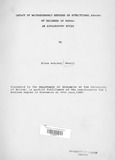| dc.description.abstract | This study investigates effects of macroeconomic reform policies on nutritional status of children over the period 1982 and 1988. The effects of the policies are analysed through changes occurring in household activities. Food consumption, food prices and household income are identified as the most important factors affecting nutritional status. These variables are linked to policies through changes in agricultural production. Data is derived from scanty secondary sources. The analytical approach adopted is comparative analysis and intuitive derivation of effects on nutritional status. The significance of the change in nutritional status is established by testing the difference between means over 1982 and 1988. Nutritional status of children improved significantly in three districts studied. Malnutrition was reduced by 28.9% in Siaya: 11.6% in Muranga and 2.2% in Taita Taveta districts. Based on the limited data available, it appears that there was an improvement in nutritional status in the country over the period considered.
While the improvement on nutritional status is partly attributed to macroeconomic policies, factors also influencing nutrition. Nutritional status was found to there are non-policy
The improvement in be due to greater consumption of own produce. changes. in other sectors also affect nutrition apart from agricultural production | |

